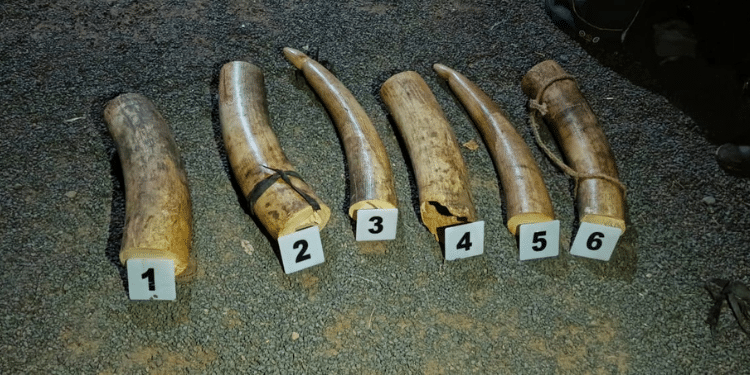A joint team of law enforcement officers drawn from Mbeere South-based detectives and Kenya Wildlife Service (KWS) officers has arrested three wildlife traffickers and recovered six elephant tusks.
Michael Kariuki Kithaka, Morris Kariuki Njuki, and Margaret Syombua Mutua were arrested in Mbeere South, a region near Mount Kenya National Park, known for human-wildlife conflict and poverty-driven environmental issues.
The suspects were caught at Siakago-Kiritiri Junction with 48 kilograms of elephant tusks concealed in two gunny bags.
Also Read: KWS Makes Changes at Nairobi National Park After Uproar
The suspects have been remanded in custody until June 11, 2025, pending a pre-bail report, indicating that the judicial process is ongoing as authorities continue their investigations.
The suspects were charged with dealing in and possessing wildlife trophies of an endangered species without a permit, under the Wildlife Conservation and Management Act of Kenya (No. 47 of 2013).
This Act provides a comprehensive legal framework for the protection, conservation, and management of wildlife resources across public, community, and private lands, as well as Kenya’s territorial waters.
The Act prohibits the possession of trophies, ivory, or rhinoceros horn without a certificate of ownership.
Penalties include a fine up to 30,000 shillings or imprisonment up to 5 years for dealers, or up to 10,000 shillings or 3 years for others, with the possibility of both, and forfeiture of the seized items.
The Act also prohibits the export of certain trophies, including elephant tusks, without proper permits, further emphasising the illegality of possessing such items without authorisation.
Kenya plays a significant role in the global wildlife trade, serving as both a source and transit point for wildlife commodities, particularly ivory.
A 2016 report by TRAFFIC highlights that Kilindini Port in Mombasa and Jomo Kenyatta International Airport in Nairobi are major exit points for illegally traded wildlife products, with ivory primarily destined for Asia.
The report also notes that corruption among government and private sector officials is a key enabling factor, undermining enforcement efforts despite progress in curbing wildlife crime.
Also Read: KWS Responds to Long Queues of Stranded Tourists at Nairobi National Park
The arrest of the three suspects in Mbeere South by KWS is a significant step in Kenya’s efforts to combat wildlife trafficking, particularly the illegal trade of elephant tusks, which threatens endangered species.
It reflects the collaborative work of DCI and KWS, supported by a robust legal framework, and aligns with recent trends of increased enforcement and convictions.
This incident serves as both a report of a successful law enforcement operation and a call to action against wildlife trafficking, highlighting the ongoing struggle to protect Kenya’s biodiversity.
Follow our WhatsApp Channel and X Account for real-time news updates.
























































![Senator Allan Chesang And Chanelle Kittony Wed In A Colourful Ceremony [Photos] Trans Nzoia Senator Allan Chesang With Channelle Kittony/Oscar Sudi]( https://thekenyatimescdn-ese7d3e7ghdnbfa9.z01.azurefd.net/prodimages/uploads/2025/11/Trans-Nzoia-Senator-Allan-Chesang-with-Channelle-KittonyOscar-Sudi-360x180.png)




















